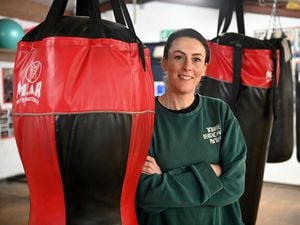Gill and Teddy join Walk All Over Cancer for Cancer Research UK
While Gill Humpage was having chemotherapy for breast cancer in 2020, her rescue dog Teddy never left her side.

The pair became best friends after he was found abandoned in a cemetery in Serbia and Gill paid for his rescue and passport to the UK.
After she saved his life, Teddy repaid the kindness by helping to look after Gill while she was recovering from chemotherapy during lockdown.
“When my husband went to work Teddy would come and sit on my knee and stay beside me all day,” said Gill, who adopted Teddy via the Balkan Underdogs charity in 2017. “If I went to sleep, I’d wake up and he’d be there. I’m sure he knew I was poorly. He’s just adorable – he’s my world.”
Now in remission, Gill, along with her trusty friend Teddy, will be walking 10,000 steps every day in March to help support Cancer Research UK’s life-saving mission.
Gill, a 55 year-old cleaner who runs her own crafting business, knows first-hand just how important new breakthroughs are to help people like her survive.
“I owe everything to research into better treatments so now I want to give back to help save more lives,” said Gill. “Teddy really helped my recovery because he kept me company through treatment and pushed me to think about something else other than myself and the cancer. As I began to get better, I found walking with him and getting fresh air was great for my mental health too.”

Gill, who lives in Rugeley, was diagnosed with cancer in October 2019 after experiencing a dull ache in her left breast. She underwent surgery to remove the lump in December that year followed by six months of chemotherapy and four sessions of radiotherapy during lockdown in 2020.
“Doctors hoped I would only need radiotherapy however tests showed the tumour was fast growing which meant I needed chemotherapy first,” said Gill. “The worst part about that was finding out I couldn’t be with my daughter Abbie during the birth of her first baby. We’d planned I’d be her birthing partner so that was absolutely devastating.”
Gill had her first chemotherapy in January but was rushed back to hospital with severe side effects a few days later. Her granddaughter Arabella was born the day after her second dose in February 2020.
“I’d had an adverse reaction to the chemotherapy where my muscles were twitching and contracting,” said Gill. “The pain was excruciating – worse than childbirth. After I returned from hospital it took me days to be able to walk again. That’s when Teddy really began to look after me.”
As a result of the adverse reaction, Gill only had four out of the six planned doses of chemotherapy. Her radiotherapy had to be given in double doses during lockdown to reduce the number of hospital visits. But since treatment ended 18 months ago, Gill has gone from strength to strength.
“I hope people will follow in our footsteps and Walk All Over Cancer this March,” said Gill. “People can go at their own pace and build the steps into their day-to-day routine, whether they walk on their own or with family and friends. The important thing is every step will help Cancer Research UK to keep making great strides in the fight against the disease.”
Paula Young, Cancer Research UK’s spokesperson for the West Midlands, said: “Every day we see the benefits of research we’ve previously funded being realised, helping people live longer and healthier lives.
"One in two of us will get cancer in our lifetime, and so we will never stop striving to create better treatments for tomorrow. That’s why we need everyone to step up to Walk All Over Cancer. It’s a safe and simple way to show support during these challenging times and a great way for homeworkers to increase their daily step count.
“Plus, knowing you’ll be helping to save and improve lives for generations to come is the ultimate motivation. We've come so far. And we will go much further. Together we will beat cancer.”
Ten thousand steps is equal to about five miles, based on the average person’s strides, so by the end of March, participants will have clocked up more than 150 miles.
“That’s quite a challenge for some,” added Paula. “But adopting small changes that you can stick to can really add up – whether it’s taking part in conference calls on the go, exploring local beauty spots or treating the dog to a month of extra-long walks.”
Walk All Over Cancer participants can connect their online giving page with FitBit to automatically publish their step count and share their progress with their supporters throughout the month.
“This past year proves, more than any other, the value of research and what can be achieved together,” said Paula. “Just like science is our route out of the pandemic, science is our route to beating cancer.
“From proving the link between smoking and cancer to laying the foundations for modern radiotherapy – our scientists have been at the forefront of cancer research for 120 years. And we’re not stopping now – so we hope people will pull on their walking shoes and help us to keep pushing forward.”
Cancer Research UK was able to spend over £10 million in the West Midlands last year on some of the UK’s leading scientific and clinical research. The charity’s ambition is to see three in four people survive their cancer by 2034.
To sign up and receive a free fundraising pack and t-shirt, visit cruk.org/walkallover.





